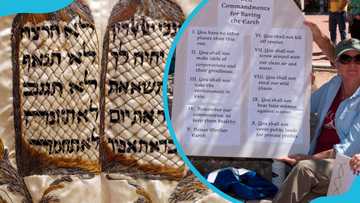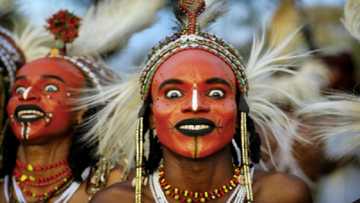Gonja: basic phrases and interesting facts
Do you plan on taking a trip to the northern part of Ghana? If that is the case, you might want to stop and ask yourself, who is Gonja? This is because this is one term that you are going to encounter while in the region. Gonja refers to one of the North Guang languages spoken by the occupants of the northern region of Ghana. This is a language spoken by at least a third of the population in the region.

Source: UGC
Gonja language is one of the local dialects of the Guang language and is a language spoken by people in the northern region of Ghana. The language has official recognition as it is spoken in some of the schools in the area. For this reason, there are cases where a visitor might encounter instances where the locals in the area will be speaking the language. For this case, it will be wise to learn some of the few phrases to minimise the problem of communication barrier.

Read also
The Ten Commandments translated into Ebonics: A creative blend of biblical law and urban expression
Basic Gonja phrases
If you do not know how to speak the language and are thinking of vising the northern region, it will be better for you to learn some of the phrases in the language. You do not have to go through the hustle of leaning the whole language as these phrases will help you have an easy time communicating. You could also use some of the phrases to relate to those that you do not know and understand the meaning.
READ ALSO: Akuapem Twi: basic phrases and interesting facts
Pronouns in Gonja
It is vital to master the pronouns in the language so as to ensure that communication is effective. These are some of the translations for pronouns:
- ma - This is the pronoun for 'I'.
- fo - This is the pronoun for 'you'.
- mu - This is the pronoun for 'she'.
- e - This is the pronoun for 'he'.
- anye - This is the pronoun for 'we'.
- bumu - This is the pronoun for 'they'.
Mastering these pronouns is one of the key aspects of learning Gonja.
Greetings in Gonja
Greetings is one of the signs of peace. It is also one of the signs of showing respect. It is vital to master the type of greeting and the time when it is exchanged. It is also important to take note of the response that you will be expected to give in case someone greets you in the language. These are some of the different greetings that you might be required to familiarise yourself with:
- ah-sue-mah - This refers to greetings that are exchanged in the morning.
- kla-dah - This refers to response for greetings exchanged in the morning. It is used to imply that you are fine.
- on-trey - This refers to greetings exchanged in the afternoon.
- ah-new-lah - This refers to greetings exchanged in the evening.
- ah-whoa - This refers to saying that you are fine. It could also be used as response for most greetings.
It is important for one to master the different times when these greetings are exchanged.
Other Gonja greetings in the form of questions
Apart from the normal greetings that most people prefer to use, there are questions that could be posed to relate to how you are feeling and your wellbeing. Some of these questions include:
- Ah des sa pah? - Which means 'Did you sleep well?'
- Eb-ee tow? - To mean: 'How is the house?'
- Break dew-nu-sue? - To mean: 'How was break?'
- En tah fi yo? - To mean: 'En tah fi yo?'
- Em-be-ah dew-nu-sue? - Used to mean: 'Em-be-ah dew-nu-sue?'
Simple Gonja terms

Source: UGC
Apart from the greetings, there are some terms that are likely to come up in the conversations in the language. These are some of the terms that you ought to keep up with:
- bor-ee - For God.
- em-bor-ee - For rain.
- ka-zune-too - For work.
- chew - For water.
- coh-see - For Bean cake.
- coh-chee - For chicken or hen.
- pin-pin - For fufu stick.
- ki-peen-ee - For fufu bowl.
- Ewura - For Chief.
- BorƐ esa - To mean a gift from God.
- BorƐ walae - To mean: God is good.
- BorƐ ena sa - To mean: God is the giver.
- BorƐ wu - To mean: God has seen.
These are some of the simple phrases that might come up in the middle of the conversations.
Interesting facts about the Gonja community

Source: UGC
Are you looking forward to knowing more about the community? If that is the case, noting these important facts about the Gonja will help to know what to expect when you visit the region where the language is spoken.
- The population of the Gonja community in Ghana is more than 285,000.
- The Gonja tribe is among the first occupants of the country.
- The Gonja language is related to the Guan language even though more than one-third of the population in the northern parts of Ghana speak the language.
- Gonja language is a local dialect under the Guan language.
- Like most tribes in the country, the Gonja also have tattoos on their bodies as a mark of identity. These tattoos are found on the cheeks, neck or even on the chest. Some people have them between the eyes, on the ears or even on their arms.
- The eastern part of Gonja has the biggest slave market. It also has the highest number of hand-dug wells which in most cases were used in bathing the slaves.
- The members of the Gonja tribe are very strict when it comes to religion. Most of them are very religious and Islam religion is accounted for by about 58% of the population of the tribe.
- The main economic activity that the Gonja practise is farming and fishing. They also take part in hunting.
- The former president of Ghana: John Dramani Mahama is Gonja.
- The vowels that are used in the tribe are: a,e,i,o,ɔ,u,ɛ. whereas some of the special consonants that are used in the language include: ch , ŋm, ny, gb, kp, sh.
Gonja is not a difficult language to master especially after understanding how these phrases are used. That way, you can slowly learn how to construct simpler to the complex sentences.
READ ALSO:
- Asante Twi: basic phrases and interesting facts
- Talensi: basic phrases and interesting facts
- Fante: basic phrases and interesting facts
Source: YEN.com.gh





